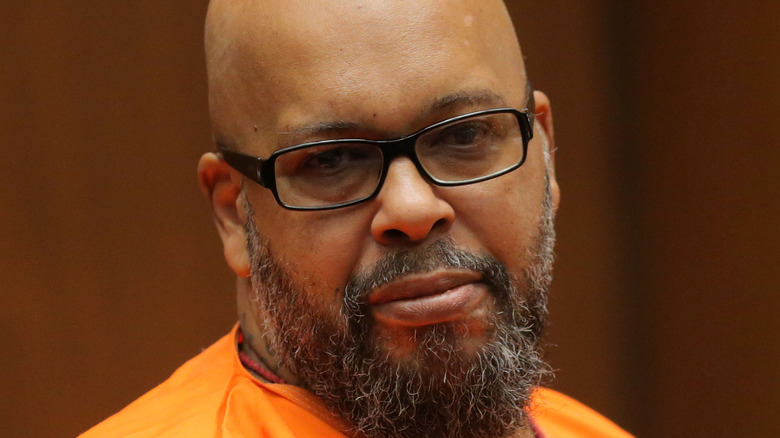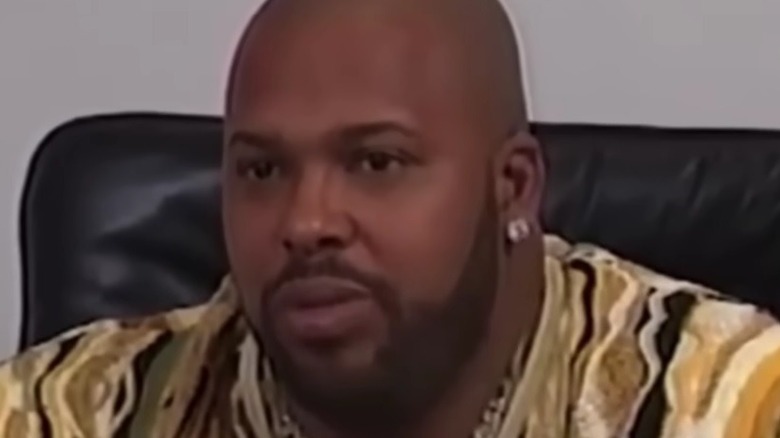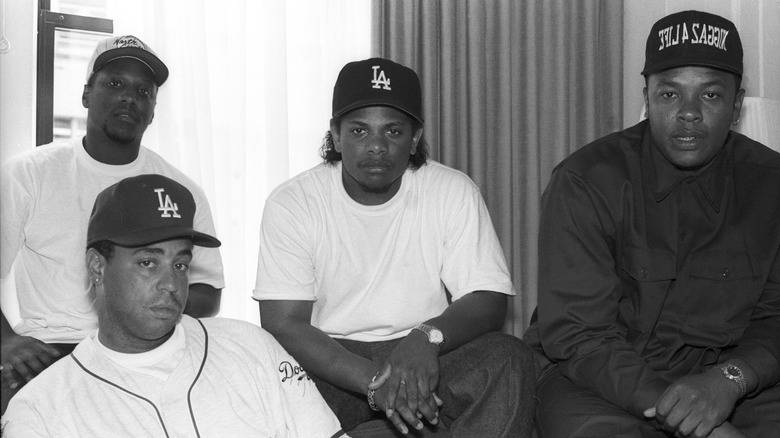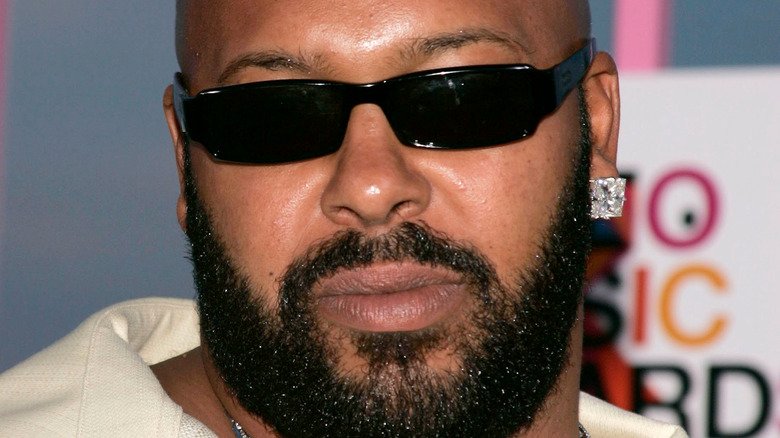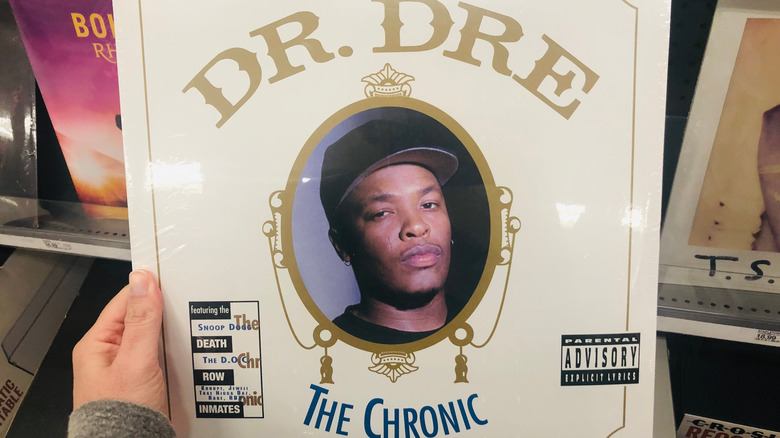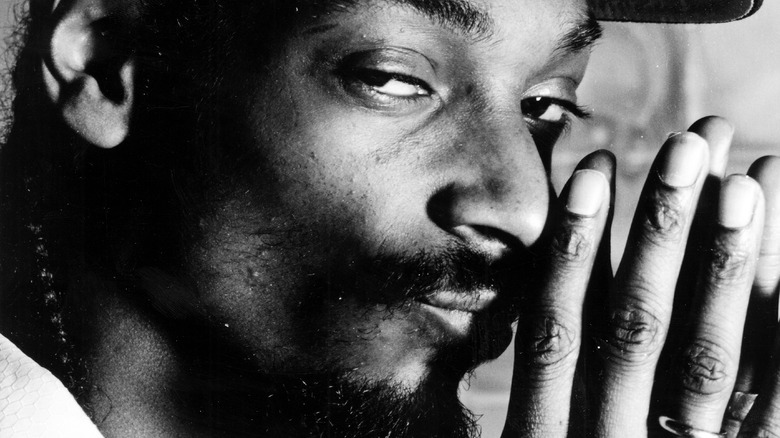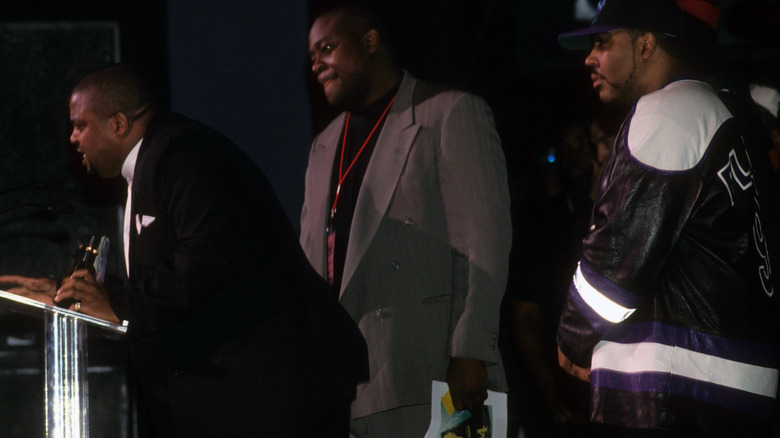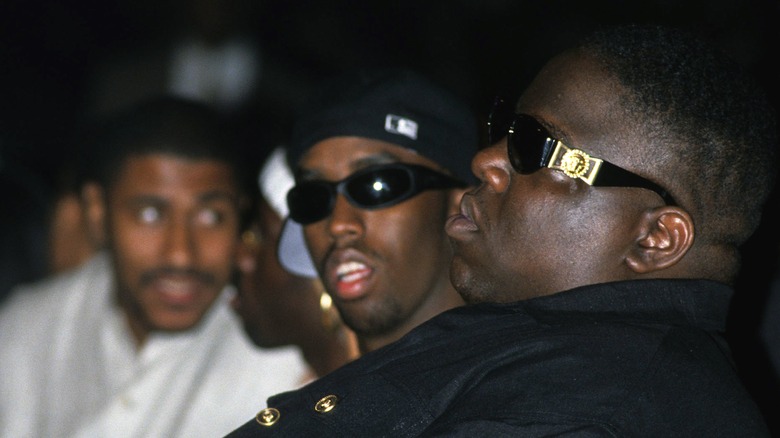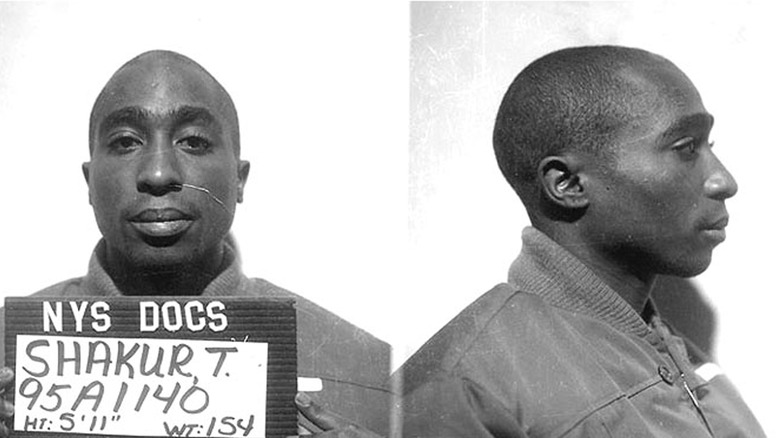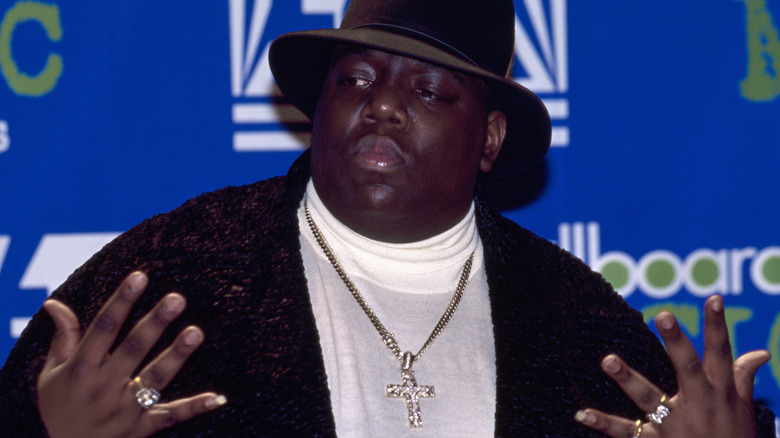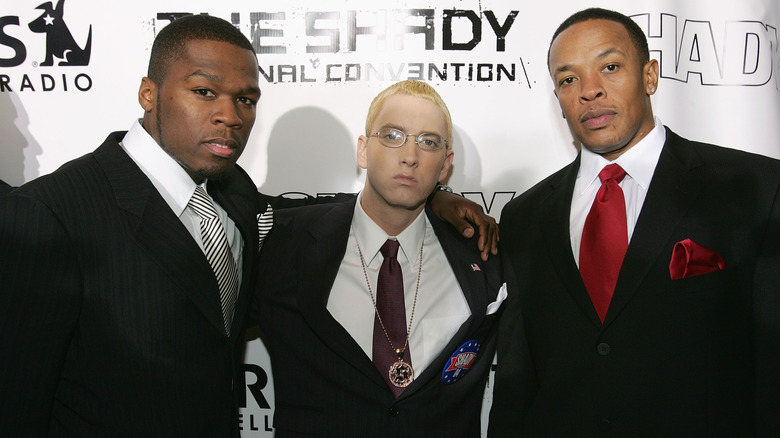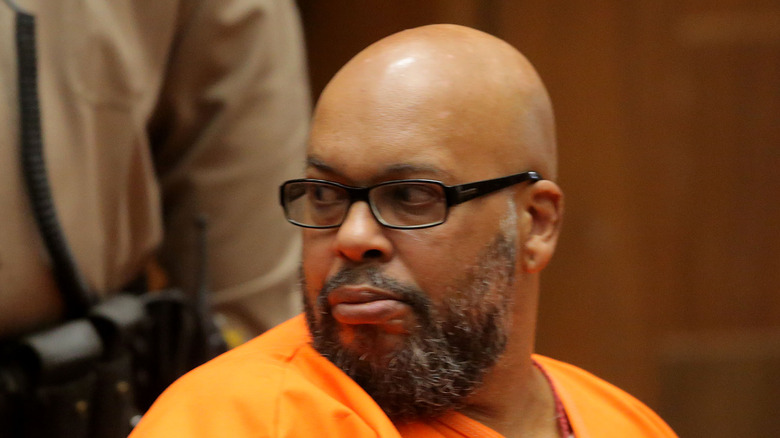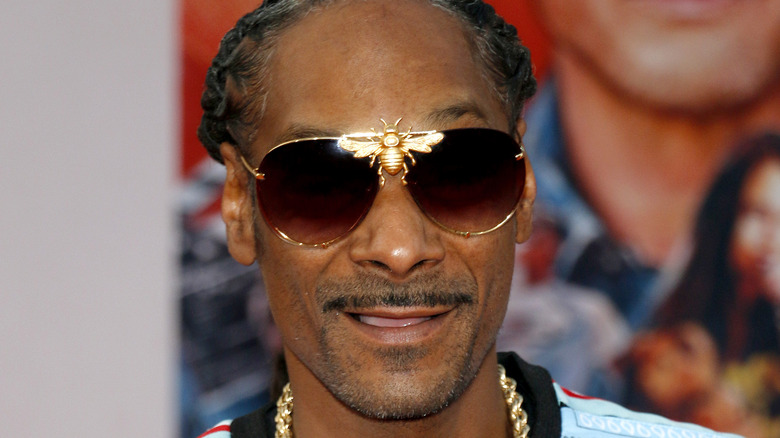The Meteoric Rise And Fall Of Death Row Records
The genre of rap music underwent a stunning transition in the 1990s. As the decade dawned, rap artists were pretty evenly split among easily definable camps, the main ones being lyrical masterminds like Rakim and KRS-One, pop rappers like MC Hammer and the Fresh Prince, experimental and fusion artists such as A Tribe Called Quest and Pharcyde, and gangster rappers like NWA and Ice-T. Around 1993, though, gangster rap and its derivatives would vault past all the rest to dominate for over half the decade, leaving a lingering influence to this day — and at the center of it was Death Row Records.
The label was co-founded and creatively led by legendary producer Andre "Dr. Dre" Young, whose previous outfit NWA achieved platinum success with virtually no radio play — but Death Row brought gangster rap to the mainstream airwaves, making a superstar out of Dre and a bona fide mogul out of co-founder Marion "Suge" Knight, whose business style could politely have been described as "brutal." Death Row's rise was lightning-fast, but its reign was short — and its story is a reminder that when life imitates art a little too much, things can get seriously out of hand.
The business minds behind the label
In addition to being a shrewd business mind, Suge Knight has always been a physically intimidating man. He's built more like a football player than an executive, and with good reason: He began his public life as a defensive lineman for the University of Nevada at Las Vegas, and then the Los Angeles Rams, according to Biography. In the late '80s, he made his way into the music business by acting as a bodyguard for some high-profile artists before dabbling in promoting and then starting a music publishing business.
Per MTV News, Knight eventually hooked up with SOLAR Records executive Dick Griffey, who'd had a hand in a metric truckload of hit singles in the '80s, and who agreed to hook Knight up with financial backing and a distribution network for a new independent label. Griffey's decision to invest his cash and energy just may have been made easier by the fact that Knight had an inside line on some formidable talent to get the label off the ground, as he happened to be an acquaintance of Tracy "The DOC" Curry — a once-promising Dallas rapper who had the ear of one of the hottest producers in rap, as Curry himself explained in an interview with MurderDog.
Dr. Dre and the DOC
In his MurderDog interview, the DOC explained that his early demos had caught the attention of Dr. Dre, who was putting together a roster for Ruthless Records, a fledgling label that had been started using illicit funds from drug dealer and aspiring rapper and music executive Eric "Eazy-E" Wright (per Britannica). Dre included a couple selections from DOC's group, the Fila Fresh Crew, on NWA's first, compilation-style record, "NWA and the Posse," and subsequently leaned on the rapper's killer pen to provide lyrics for NWA's breakthrough album "Straight Outta Compton," as well as Eazy-E's solo album "Eazy-Duz-It."
The DOC's platinum-certified debut album, "Nobody Can Do It Better," was released on Ruthless — but shortly after its release, the budding star was involved in a car accident that severely damaged his vocal cords. DOC, however, was friends with Suge Knight — and DOC was well aware that his talents could help his buddy out with his new musical endeavor. Together, the two of them convinced Dre that Eazy-E and NWA manager Jerry Heller were cheating Dre out of money. "Me and Suge were talking, and we knew we needed Dre to make this thing work," DOC explained. Dre was amenable to jumping ship, but there was a slight problem: Dre and DOC were still under contract with Ruthless. Knight, however, had his own ideas about how to overcome this obstacle.
Suge Knight got the new label off the ground using questionable means
According to Dr. Dre associate and producer Erotic D, Suge Knight's solution was simple: He showed up at the Ruthless offices, threatened Eazy-E with bodily harm if he refused to let Dr. Dre and DOC out of their contracts, and left the offices with said contracts in hand, delivering them to Erotic D for safekeeping (via DubCNN). With that done, Knight set out to secure more financing, and not by way of a bank loan.
First, Knight hooked up with notorious drug kingpin Michael "Harry-O" Harris. In an interview with Spectrum News, Harris recalled that he acted as a shadow co-founder of the label that would become Death Row, and he even helped to manage it in its early days while behind bars on drug charges (via Classic Album Sundays). Next, Knight applied a little squeeze to one of the hottest rappers of the early '90s: Vanilla Ice, whose first studio album "To the Extreme" had included a handful of songs written by an associate of Knight's publishing company. Speaking with Dan Patrick, Ice recalled that Knight had visited him in his hotel room to gently convince him to pony up some dough for the contributions — an incident that Ice told Patrick was not quite as threatening as has since been speculated. ("He was always nice to me," Ice recalled, "and it was really strange because he's huge.") With the talent and funding in place, the newly christened Death Row Records moved full-throttle ahead — and it didn't take long for the new label to make a major impression.
Death Row dropped a stone-cold classic almost immediately
According to The Washington Post, Dr. Dre's involvement in Death Row caught the attention of legendary executive and producer Jimmy Iovine, who stepped in to smooth over the situation with Ruthless. Per Hip-Hop Hero, he negotiated an end to the lawsuits brought by Eazy-E over Suge Knight's strongarm tactics, clearing the way for Death Row's first official release, with Iovine's Interscope Records providing distribution.
And what a release it was. In 1992, Death Row dropped Dre's solo album "The Chronic," which was rife with contributions from hungry, up-and-coming rappers such as RBX, Lady of Rage, Kurupt, and Nate Dogg — as well as a young man named Calvin Broadus, who went by the unlikely moniker of Snoop Doggy Dogg, and whom Dre had previously recruited to perform guest vocals on his theme song to the feature film "Deep Cover" (via HipHopDX). A departure from the rough, aggressive sound of NWA, "The Chronic" introduced the world to what would become known as "G-Funk" — a hazy, laid-back, vaguely ominous sound that drew from funk and soul records. The album was a smash hit, generating three Top 40 singles, spending eight months in the Billboard Top Ten, and winning a Grammy Award — but Death Row was just getting started.
A new megastar dropped a second straight smash
While it can't be denied that "The Chronic" raised the profiles of all of its featured artists, it only made an instant household name out of one: Snoop Dogg, whose laid-back delivery and clever wordplay (featured to great effect on the album's lead single "Nuthin' But a G Thang") hit the sweet spot with rap fans. A Snoop solo project quickly became a priority for Death Row, and it didn't take long for it to come to fruition: In 1993, the label dropped "Doggystyle," and the album cemented the fact that Snoop wasn't just a standout among Death Row's ensemble; he was a major star in his own right.
Per MTV News, "Doggystyle" was the first debut album by any artist in any genre to enter the Billboard chart at No. 1. It moved 800,000 copies within its first week of release, eventually going quadruple-platinum, and produced two Top 10 singles in "What's My Name?" and "Gin and Juice," both of which continue to be bumped at parties far and wide to this day. The second straight blockbuster success for Death Row might have portended a bright future for the label — had it not been led by Knight.
Suge Knight poured gasoline on the East Coast-West Coast rivalry
The burgeoning West Coast rap movement of the late '80s was viewed with a mixture of suspicion and condescension by many East Coast artists, as rap itself began largely as a New York-based phenomenon. In 1991, Bronx MC Tim Dog codified the rivalry on his debut album "Penicillin On Wax," which contained a track titled "F*** Compton" (via XXL). Dr. Dre responded with a shot or two at Tim Dog on "The Chronic," but the beef was largely simmering until a few years later, when Suge Knight took it upon himself to turn up the heat.
At the 1995 Source Awards in New York City, Snoop was honored with an Artist of the Year trophy. Determined to be a sore winner, Knight stepped to the podium to deliver a few choice remarks that seemed to be aimed squarely at Bad Boy Records executive and producer Sean "Puff Daddy" Combs, whose protege Christopher "Notorious B.I.G." Wallace was on the fast track to stardom (via Billboard). When the crowd later booed Dre's Producer of the Year win, Snoop got in on the action with a profane tirade — and just like that, the East Coast/West Coast beef went from "kind of juvenile and amusing" to "life-threateningly dangerous" in a single evening.
The Death Row-Bad Boy beef turned serious
The first serious sign of violence brewing within the ranks of the world's most popular rappers took place later that very night. According to Derrick Parker's book "Notorious COP: The Inside Story of the Tupac, Biggie and Jam-Master Jay Investigations from NYPD's First Hip-Hop Cop," anonymous sources reported that a member of the Bad Boy entourage had his gold chain lifted after the awards ceremony, and that a notorious local criminal by the name of Ben "Killer Ben" O'Gara had been involved. A short time later, O'Gara was shot dead while talking on a pay phone — and those sources indicated that Christopher Wallace himself had put out the hit. Of course, this has never been proven, but the very fact that such a high-profile member of the Bad Boy camp would be implicated in murder-for-hire is troubling, to say the least.
Not even two months later, a skirmish between Death Row and Bad Boy associates at an Atlanta nightclub resulted in the shooting death of Suge Knight's friend Jai Hassan-Jamal Robles, a hulking gangster known as "Big Jake," who had been released from prison just two days prior, according to The Village Voice. Suge Knight and Sean Combs were both present that night, and a few years later, Combs would find himself in the middle of yet another nightclub shooting (per The New York Times) — but not before tragedy struck, not once but twice.
Suge Knight made a fateful deal with Tupac
The seeds for those twin tragedies were sown when, in late 1994, legendary rapper Tupac Shakur was shot five times and robbed at a New York recording studio at which Sean Combs and Christopher Wallace were both present. In a 1995 Vibe interview, Shakur remembered that he was immediately suspicious that Combs and Wallace had prior knowledge of what was about to go down — despite the long friendship Shakur had previously shared with Wallace, as detailed in author Ben Westhoff's "Original Gangstas: The Untold Story of Dr. Dre, Eazy-E, Ice Cube, Tupac Shakur, and the Birth of West Coast Rap." Those suspicions were not allayed when, just months later, Wallace released a single entitled "Who Shot Ya?" which Shakur — who was in jail on sexual abuse charges at the time — took as a flagrant taunt (via Slate).
So it came to be that, in September 1995, Suge Knight flew to New York to post Shakur's hefty bond, on one condition: That the superstar rapper sign with Death Row (per the book "Changes: An Oral History of Tupac Shakur" by Sheldon Pearce). The move proved to be a good one for Death Row; Shakur's first release for the label, the double album "All Eyez On Me," debuted at No. 1 and sold five million copies within a year, per Britannica. It didn't turn out to be so great for Shakur, whose insertion into an already-volatile rivalry may just have cost him his life.
The murders of Notorious BIG and Tupac were the beginning of the end
On September 7, 1996, Suge Knight and Tupac Shakur were involved in an altercation with a Crips gang member after a Mike Tyson fight in Las Vegas. Hours later, as they waited at a red light, their car was riddled with bullets, four of which struck Shakur in the chest and one of which grazed Knight, according to the Los Angeles Times. Shakur died days later in the hospital.
Just months later, on March 9, 1997, Christopher Wallace was gunned down in a drive-by shooting in Los Angeles, per The New York Times. It has since been widely speculated that Wallace's murder was in retaliation for Tupac's, since — as outlined by documentary filmmaker Nick Broomfield in an interview with the Independent — multiple lengthy investigations, both of the official and journalistic variety, indicated that the bad blood between the camps had finally boiled over. It was at this point that rap fans seemed to decide en masse that perhaps the East Coast-West Coast rivalry had ceased to be any kind of fun.
As for Knight, the fight during his fateful Vegas trip with Shakur constituted a violation of his probation, which stemmed from a 1992 assault conviction, per the Los Angeles Times. Just over a week before Wallace's murder, Knight was sentenced to nine years in prison, precipitating the swift decline of a label that had been ruling the rap world just a few years prior.
Dr. Dre moved on with Aftermath and Eminem
In the middle of all this, Dr. Dre apparently decided that he'd had more than enough of Suge Knight. In an interview with Hit Quarters, A&R executive Angelo Sanders recalled that Dre formed a new label, Aftermath Entertainment, in 1996, which continued Death Row's marketing and distribution arrangement with Interscope. It didn't take long for Dre to strike gold while searching for acts to fill out his roster. In 1997, he came across a demo from a skinny white guy with the corny stage name Eminem, who turned out to be a pretty good signing.
Speaking with XXL in 2008, Em's associate Bizarre recalled that the legendary MC had been considering smaller labels before attracting Dre's attention. "I think he would have just been one of those guys that was respected as a dope lyricist in the underground circuit," Bizarre said. "I don't think it would've gotten to the level that it got to without Dre." More success followed, including fruitful relationships with the likes of 50 Cent (via BBC) and Kendrick Lamar, according to Aftermath's website. Did Suge Knight attempt to stoke a rivalry upon his release from prison? Of course he did. Did it work out? Not so much.
Suge Knight's incarceration led to decline and bankruptcy
Suge Knight was released from prison in 2001, and he made it his first order of business to return Death Row to prominence. He rebranded the label "Tha Row," but before he could restore the label to its former glory, Knight violated his parole and was sent back to prison in 2003. He filed for bankruptcy in 2006 and sold Death Row off two years later (via Biography).
More legal troubles followed, culminating in a bizarre incident in 2015 in which Knight, who had been skulking around the set of a commercial for the NWA biopic "Straight Outta Compton," followed two men to a nearby burger joint after an argument. The Los Angeles Times reports that, in the confrontation that followed, Knight ended up running over the men with his truck, killing one of them and injuring the other. Did he stick around to answer the cops' questions? Of course not, and in 2018, he was sentenced to 28 years behind bars for hit-and-run resulting in death. He remains in prison as of this writing.
Snoop Dogg is bringing Death Row back from the dead
Death Row remained largely ... well, dead for some time, its assets having been acquired by a subsidiary of the global investment firm Blackstone, according to Business Wire. But in 2022, something kind of miraculous happened: The brand was purchased from that subsidiary by none other than Snoop Dogg, who quickly announced his intention to "[build] the next chapter of Death Row Records." A press release quoted Snoop as saying, "It feels good to have ownership of the label I was part of at the beginning of my career and as one of the founding members."
A couple of days later, Snoop dropped his 20th solo album, "B.O.D.R.," an acronym for "Bacc on Death Row," according to Broadway World. (The two C's are significant to Snoop's, er, background.) He followed up that release two days later with an appearance rocking the Super Bowl halftime show, so it was a pretty good year for Snoop. If anyone can restore some respectability to the Death Row name, perhaps it's the Doggfather, whose plans for the label seem to include expanding beyond music production. In December 2022, he announced the launch of a Death Row-branded cannabis line (per Forbes).
